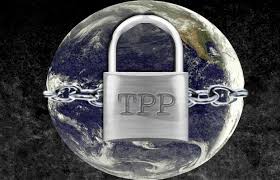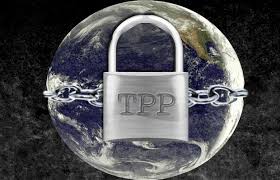
After five years hectic and negotiations, the Trans-Pacific Partnership was finally finalized and an agreement reached between the countries.
In what is evidently the largest trade deal in two decades, the US, Japan, Canada, Australia, New Zealand and seven other Pacific-rim nations reached an agreement and a deal was signed on Monday.
According to economists, the deal between the aforesaid countries comprises 40% f the global economy and the new treaty would create a new Pacific economic bloc with reduced trade barriers for everything from beef and dairy to textiles and pharmaceuticals.
In what has been seen as a final attempt to get the deal completed, representatives from the various countries have been negotiating over the past six days in Atlanta.
Patents for new “biologic” pharmaceuticals and access to New Zealand’s dairy in countries like Canada, Japan and the US were some of the sticking points of the deal which has been slow.
With protests over the secrecy of the detail in the negotiations, the negotiations have also been met with disquiet over the years.
The deal will still have to be ratified by the members’ governments, which may be a difficult task for some even while the agreement has been signed by the 12 nations.
For example, getting the deal through the Congress before it can be ratified, can be a political nightmare for US President Barack Obama.
Since the US President has to give 90 days’ notice to Congress that he intends to sign any trade deal, Barack Obama would only be able to sign the deal in January at the earliest. While the Presidential elections are round the corner, the US Congress would perhaps only be able to take up the matter only after the middle of next year due to other requirements.
The deal has already been attacked by republican frontrunner Donald Trump even before it was signed.
“The Trans-Pacific Partnership is an attack on America’s business. This is a bad deal,” Trump said earlier this year.
The Trans Pacific deal will cut trade barriers and set common standards for 12 countries and the trade ministers of the Pacific countries have reached a deal on the most sweeping trade liberalization pact in a generation, an official familiar with the talks said on Monday. The deal could reshape industries and influence everything from the price of cheese to the cost of cancer treatments.
However there were many touchy questions that came up during the last round of talks which included how long a monopoly period should be allowed on next-generation biotech drugs, until the United States and Australia negotiated a compromise. Biologic drugs, made by companies including Pfizer Inc, Roche Group’s Genentech and Japan's Takeda Pharmaceutical Co. and the period of monopoly on the drugs nearly forced a closure to the agreement.
While countries like Australia, New Zealand and public health groups had sought a period of five years to bring down drug costs and the burden on state-subsidized medical programs, the US wanted 12 years of protection to encourage pharmaceutical companies to invest in expensive biological treatments like Genentech’s cancer treatment Avastin.
The deal would introduce tariff reduction schedules on hundreds of imported items from pork and beef in Japan to pickup trucks in the United States. However the deal had also been perceived as a potential threat to an array of interest groups from Mexican auto workers to Canadian dairy farmers.
(Source:www.reuters.com & www.digitallook.com)
In what is evidently the largest trade deal in two decades, the US, Japan, Canada, Australia, New Zealand and seven other Pacific-rim nations reached an agreement and a deal was signed on Monday.
According to economists, the deal between the aforesaid countries comprises 40% f the global economy and the new treaty would create a new Pacific economic bloc with reduced trade barriers for everything from beef and dairy to textiles and pharmaceuticals.
In what has been seen as a final attempt to get the deal completed, representatives from the various countries have been negotiating over the past six days in Atlanta.
Patents for new “biologic” pharmaceuticals and access to New Zealand’s dairy in countries like Canada, Japan and the US were some of the sticking points of the deal which has been slow.
With protests over the secrecy of the detail in the negotiations, the negotiations have also been met with disquiet over the years.
The deal will still have to be ratified by the members’ governments, which may be a difficult task for some even while the agreement has been signed by the 12 nations.
For example, getting the deal through the Congress before it can be ratified, can be a political nightmare for US President Barack Obama.
Since the US President has to give 90 days’ notice to Congress that he intends to sign any trade deal, Barack Obama would only be able to sign the deal in January at the earliest. While the Presidential elections are round the corner, the US Congress would perhaps only be able to take up the matter only after the middle of next year due to other requirements.
The deal has already been attacked by republican frontrunner Donald Trump even before it was signed.
“The Trans-Pacific Partnership is an attack on America’s business. This is a bad deal,” Trump said earlier this year.
The Trans Pacific deal will cut trade barriers and set common standards for 12 countries and the trade ministers of the Pacific countries have reached a deal on the most sweeping trade liberalization pact in a generation, an official familiar with the talks said on Monday. The deal could reshape industries and influence everything from the price of cheese to the cost of cancer treatments.
However there were many touchy questions that came up during the last round of talks which included how long a monopoly period should be allowed on next-generation biotech drugs, until the United States and Australia negotiated a compromise. Biologic drugs, made by companies including Pfizer Inc, Roche Group’s Genentech and Japan's Takeda Pharmaceutical Co. and the period of monopoly on the drugs nearly forced a closure to the agreement.
While countries like Australia, New Zealand and public health groups had sought a period of five years to bring down drug costs and the burden on state-subsidized medical programs, the US wanted 12 years of protection to encourage pharmaceutical companies to invest in expensive biological treatments like Genentech’s cancer treatment Avastin.
The deal would introduce tariff reduction schedules on hundreds of imported items from pork and beef in Japan to pickup trucks in the United States. However the deal had also been perceived as a potential threat to an array of interest groups from Mexican auto workers to Canadian dairy farmers.
(Source:www.reuters.com & www.digitallook.com)





